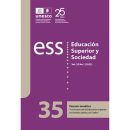New Policy Insight identifies countries that officially recognize the right to higher education

The right to higher education is embedded in the human right to education and is crucial to fostering equity and social mobility in society. Its recognition in national legislation signals countries’ objective to provide inclusive, equitable and quality higher education learning opportunities for all.
Data from the HE Policy Observatory reveals that less than 4 out of 10 (37%) of countries worldwide recognize the right to higher education in their national legislation. This is no clear link between a country’s income level and the recognition of this right. However, there are important variations in the share of countries recognizing this right between world regions. In Central and Eastern Europe, Latin America and the Caribbean, Central Asia, and South and West Asia, most countries legally recognize the right to higher education. In contrast, this recognition drops to less than 20% in East Asia and the Pacific, and North America and Western Europe. These findings suggest that the legal recognition of the right to higher education is more driven by political and socio-cultural consideration than by income.

Recognizing this right is only a first step as governments need to implement policies to ensure everyone has equal opportunities to access, succeed and benefit from higher education. These policies often vary based on local context and can include measures such as offering free higher education, providing targeted scholarships and investing in counseling services for students from underrepresented population groups.
Some countries might have adopted policies aligned with this principle without explicitly relating them to the broad objective of guaranteeing the right to higher education. Yet, encrypting this right in the legislation can be a way to foster its effective upholding and build a common understanding around the purposes of HE.
Overall, governments, in particular from wealthier countries, should put the recognition of the right to HE in their immediate agenda to promote equity and inclusion in society and sustain social and economic progress. Moreover, engaging in the global conversation on the right to HE to discuss promising practices to uphold this principle could be a powerful driver of the advancement of higher education and social mobility worldwide.
Check out the UNESCO IESALC Policy Insight on which countries recognize the right to HE worldwide here.
RELATED ITEMS








